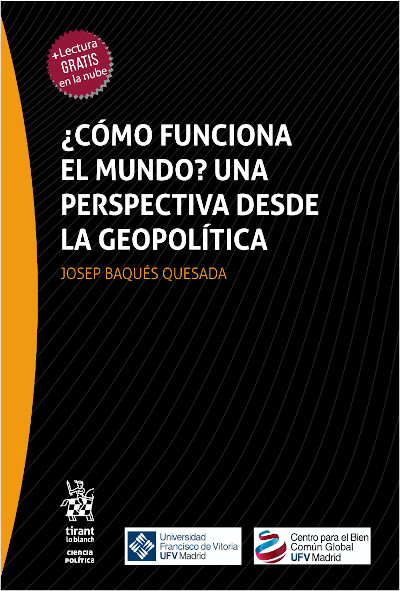In the picture
Cover of the book by Josep Baqués 'How does the world work? Una perspectiva desde la geopolítica' (Valencia: Tirant lo Blanc, 2023) 384 p.
At this point in the 21st century, two years into the war in Ukraine, the conflict in Gaza continues to threaten to spread to the Middle East and Taiwan could be the scene of war between China and the United States as early as this decade, there would be no need to defend the validity of the so-called "realist theory" of international relations.
In fact, Josep Baqués wastes no time in an apology: he simply sets out what that theory says and what its opposite - usually known as "idealist theory" (although Baqués prefers to use more specific labels for its various currents: this is the case of "liberal institutionalism") - as well as other critical theories, defend. It is enough to look at the current crisis of international institutions, the ebb of the democratic wave and the crescendo of globalization to understand that the idyllic world of those who in the 1990s spoke of the end of history due to the crowning of the liberal and democratic system has taken on water without ever fully emerging. The failure of idealism to analyze how the world works and thus to constitute a useful prospective instrument for avoiding new wars has once again drawn attention to realism and also to geopolitics, a particular perspective that offers important clues to the future of the world.
The work of Baqués, a professor of political science, is part of the theoretical foundations of international relations. It is not a narration of what happens, but a review of the theories that try to explain why it happens. The book has three chapters: the first is devoted to realism, with its various lines of thought: classical realism (Morgenthau), defensive neorealism (Waltz) and offensive realism (Miersheimer); the second, to theories critical of realism (social constructivism and Marxist interpretations); the third is on geopolitics, detailing the thesis of Mahan, Mackinder and Spykman.
The degree scroll of the book emphasizes geopolitics, and this is how the structure of the work should be understood: there is a commitment to realism, whose intellectual elaboration process is carefully followed -also examining, as if against the light, what its critics say-, and thus leads to geopolitics, which, presupposing a realist conception, provides a specific perspective. There is no doubt that the author is part of the realist current; nevertheless, he establishes a dialogue with the opposing literature, because there is no interest in disqualifying, but rather in understanding the reasoning of one or the other and in highlighting those that best fit the behavior of the states, which are the subjects of the international chessboard.
One of the great virtues of the book is that the author accompanies the reader very well in the process of understanding the generation and evolution of the different ideas, with a very transparent style that allows to distinguish what the various theoreticians say and what is an elaboration of Baqués trying to show possible developments of some approaches. It should be noted that the author is not a mere descriptor, but that he himself sample, with clear intellectual authority, the ability to build on certain legacies or to dissent from them in a reasoned manner.
In the first and second chapters there is a certain restraint on the part of Baqués; a restraint that is certainly relative, for at times he lets his hand go against idealism: "Who, then, are the guarantors of wars? The realists? Really? The paradox is served: the liberals do not go [to war] when they should (...) But they pretend to do so, beyond reason, when they should not". However, in the last chapter, when in dealing with geopolitics he arrives at the object and conclusion of his work, Baqués is forceful in defending this discipline, which some still see as controversial despite having been accurate in its warnings about many of what is happening today on the international scene. "Not paying attention to the signals of geopolitics is as much as embracing intellectual autism voluntarily and, because of its effects, even suicidal (...) Geopolitics prevents conflicts that have not yet crystallized into war. Is there a nobler task?".
Baqués argues that geopolitics is not determinism (its theorists have always presented geography as a decisive element, but not as something absolute) and that realism is not warmongering (knowing human nature, in its selfishness and aspiration for power, should rather lead to caution than recklessly launching into certain crusades). "Geopolitics is already being rehabilitated. Again, it is being rehabilitated by the force of facts. And because, once again, explanations are needed. Even if they are uncomfortable (...) Geopolitics is not, nor does it want to be, deterministic. It does not oblige anything, any State, in offensive terms (...) in any case to prevent greater evils", he concludes.

